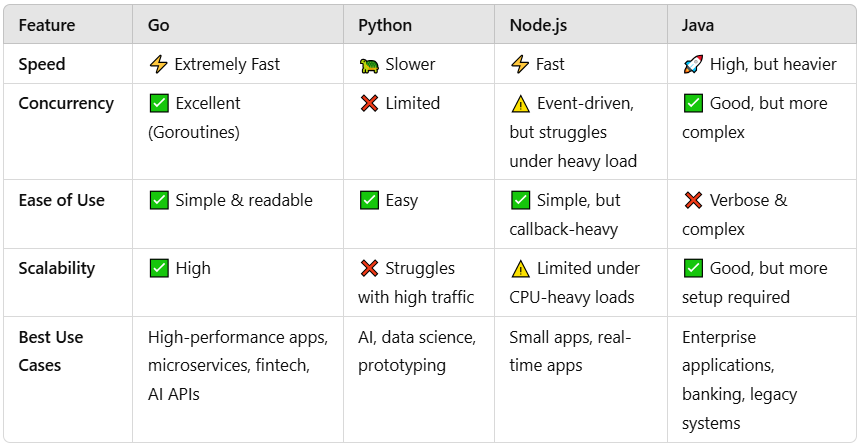Why U.S. Startups Are Adopting Go for High-Performance Backend Development
The world of backend development is constantly evolving, and in 2025, one programming language is standing out among U.S. startups: Go (Golang). Originally created by Google, Go has rapidly gained popularity among fast-growing tech companies looking for high-performance, scalable, and efficient backend solutions.
If you're running a U.S. startup, you might be asking: Why are so many companies choosing Go? And more importantly, should your startup follow the trend?
In this article, we’ll break down why U.S. startups are adopting Go, how it compares to other backend languages, and why hiring remote Go developers can be a game-changer for scaling your tech team.
🚀 Why Go is Winning the Backend Battle for Startups
Startups in the U.S. operate in a highly competitive, fast-paced environment. They need backend technologies that are:
✅ Fast and efficient – Speed matters for user experience and scalability.
✅ Highly scalable – Startups need to handle rapid growth without rewriting code.
✅ Easy to maintain – Complex systems slow down innovation.
✅ Cost-effective – Hiring developers and managing infrastructure should be affordable.
Here’s why Go checks all these boxes better than many other languages:
1️⃣ Unmatched Performance
Go is a compiled language, meaning it translates directly into machine code rather than relying on an interpreter. This gives it a huge performance advantage over languages like Python and JavaScript, which use interpreters.
- Low latency – Essential for real-time applications like fintech and AI.
- Efficient concurrency – Go’s Goroutines allow handling thousands of requests per second without crashing servers.
- Minimal resource usage – Lower CPU and memory consumption compared to Java and Node.js.
For startups building SaaS platforms, fintech applications, or AI-powered tools, Go’s speed and efficiency make it a top backend choice.
2️⃣ Scalability Without the Complexity
One of the biggest challenges for startups is scaling their tech infrastructure.
- With Go, you don’t need to rewrite your backend as your company grows.
- It was designed for handling massive amounts of traffic and distributed systems (think Google-scale workloads).
- Unlike Node.js, which struggles with heavy CPU-bound tasks, Go makes it easy to scale horizontally without performance bottlenecks.
💡 Example: Many U.S. startups switch from Python or Node.js to Go once they hit scaling issues. Instead of constantly optimizing, Go lets them grow without worrying about backend limits.
3️⃣ Simplicity = Faster Development
Startups need to move fast—launching an MVP in weeks, not months.
Go has:
- A simple, clean syntax – Easier to read and write than Java.
- Minimal dependencies – No bloated frameworks slowing down development.
- Better debugging – Since it's a statically typed language, fewer runtime errors.
This makes Go a great choice for small engineering teams that need to develop, test, and deploy quickly.
Big U.S. companies like Uber, Netflix, and Dropbox use Go because it allows them to build reliable systems with fewer developers.
4️⃣ Lower Infrastructure & Development Costs
Every startup wants to reduce costs while increasing efficiency.
- Less server power needed – Go’s efficiency means you spend less on cloud hosting.
- Less maintenance – Fewer bugs and crashes mean less time fixing code and more time innovating.
- Smaller teams can do more – A startup can hire fewer Go developers and achieve the same output as a larger Node.js or Python team.
👉 For U.S. startups trying to stretch their funding, Go is a cost-effective solution that doesn’t compromise on performance.
🆚 Go vs. Other Backend Languages

As you can see, Go outperforms other languages in many key areas that startups care about—especially for scalability, concurrency, and performance.
🔹 Why U.S. Startups Are Hiring Remote Go Developers
Hiring Go developers in the U.S. can be expensive—but there’s a solution.
Many startups are turning to remote hiring to find top-tier Go engineers at a fraction of the cost.
💡 Here’s why hiring remote developers on Remoteplatz makes sense:
✔️ Find expert Go developers worldwide in days, not months.
✔️ Reduce hiring costs without compromising on skill level.
✔️ Scale your engineering team on demand, whether you need one developer or an entire backend team.
✔️ Access a vetted talent pool with proven expertise in Go, Kubernetes, cloud infrastructure, and DevOps.
By hiring remotely, startups get the best backend talent without the overhead of in-house teams.
🔮 The Future of Go for Startups
Go isn’t just a trendy choice—it’s a long-term investment for startups that need high-performance, scalable backend systems.
💡 What to expect in 2025 and beyond:
- More startups adopting Go for AI, fintech, and real-time applications.
- Go replacing legacy Python and Node.js systems in high-traffic environments.
- Demand for Go developers skyrocketing, making remote hiring even more valuable.
If your startup is planning to scale fast, cut infrastructure costs, and build a future-proof backend, Go is the best choice for 2025 and beyond.
🚀 Ready to Build a Go-Powered Startup?
If you need to hire top Go developers fast, Remoteplatz can help.
✅ Pre-vetted, highly skilled backend engineers
✅ Flexible hiring—full-time, part-time, or project-based
✅ Reduce hiring costs while getting top-tier talent
💡 Stop wasting time on slow hiring processes—get started with Remoteplatz today!
Final Thoughts
Go is transforming backend development for fast-growing startups in the U.S. By choosing Go and hiring remote developers, startups can scale faster, reduce costs, and build high-performance applications that can handle millions of users.
🔹 Is your startup ready to scale? Hire expert Go developers today on Remoteplatz!
